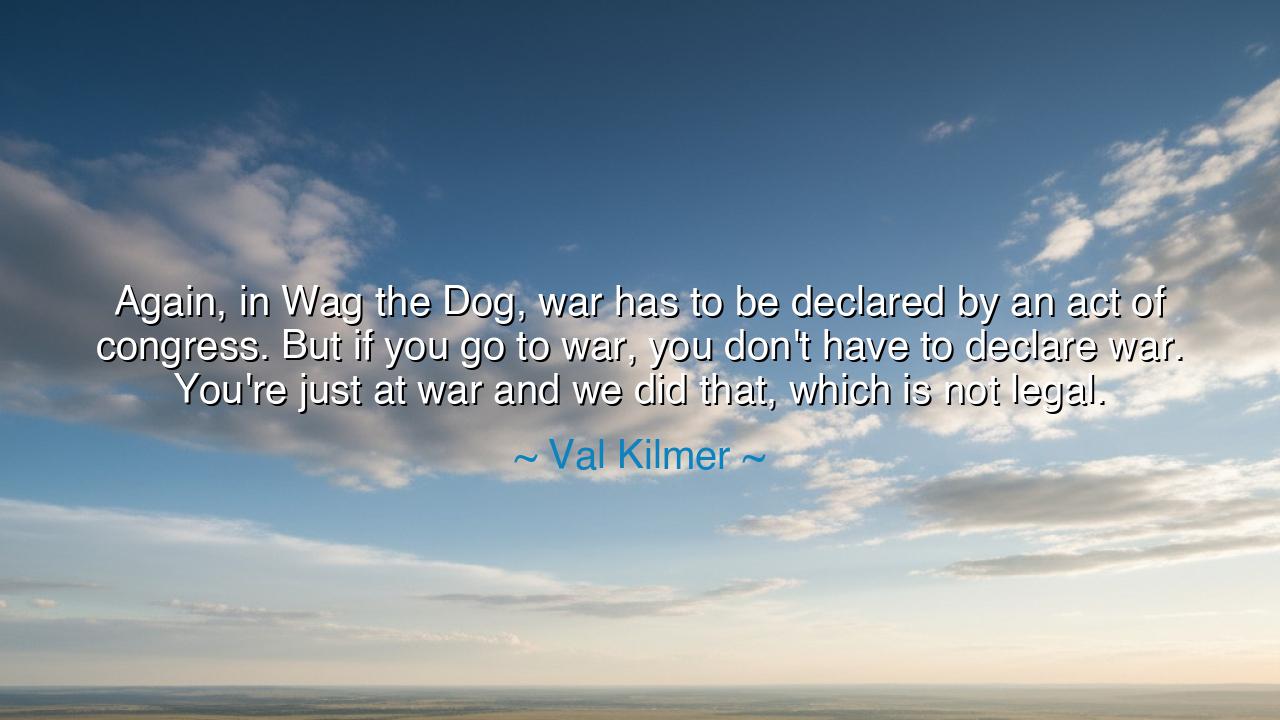
Again, in Wag the Dog, war has to be declared by an act of
Again, in Wag the Dog, war has to be declared by an act of congress. But if you go to war, you don't have to declare war. You're just at war and we did that, which is not legal.






Hear the haunting words of Val Kilmer, spoken with the clarity of one who peers through the illusions of power: “Again, in Wag the Dog, war has to be declared by an act of congress. But if you go to war, you don't have to declare war. You're just at war and we did that, which is not legal.” Beneath these words lies both satire and sorrow. He speaks of the strange hypocrisy of nations—that though the law demands war be solemnly declared, in practice, leaders have often leapt into bloodshed without permission, disguising conquest in the cloak of necessity.
At the heart of Kilmer’s words is the tension between law and action. The law says: only Congress may declare war, for such a choice belongs to the people’s representatives, not to one ruler. Yet in practice, leaders have often bypassed this sacred order, sending soldiers to die and nations to burn without such a declaration. Thus, the world has seen wars begun not by law but by will, not by the vote of many but by the command of the few. Kilmer names this plainly: “which is not legal.”
The tale of the film Wag the Dog serves as a mirror to this truth. In the story, a fake war is manufactured to distract a nation from scandal. Though fictional, it reflects the dark truth that war, once unleashed, can serve not only defense but deception. By invoking it, Kilmer reminds us that when war is waged outside the rule of law, it becomes theater as much as tragedy, a manipulation of the people rather than a protection of their rights.
History abounds with such examples. In the Vietnam War, the United States never declared war formally. Instead, the Gulf of Tonkin Resolution granted powers that unleashed years of bloodshed, based on uncertain or even false premises. Similarly, in later years, wars in the Middle East were waged without formal declarations, justified as “police actions” or “operations,” though in truth they were wars by every measure—wars of fire, death, and devastation. Kilmer’s words echo the cry of those who see in these acts the violation of the very laws meant to restrain power.
The wisdom here is not simply about legality, but about the sacred duty of accountability. For when leaders go to war without declaration, they silence the voices of the people. They deny the nation its rightful debate, its weighing of consequences, its moral reflection. War becomes the decision of the few, imposed upon the many. And when such power is unchecked, the people are no longer sovereign, but subjects of ambition and fear.
The lesson is grave and timeless: war must never be entered lightly, nor without the consent of those who will bear its cost. To bypass law is to bypass conscience, and to act in secret is to betray trust. If war is just, it can withstand the light of debate; if it must be hidden or disguised, it is already corrupted. Kilmer’s words remind us that the erosion of law is as dangerous as the war itself, for once the foundation is weakened, tyranny may rise upon its ruins.
Therefore, children of tomorrow, remember this teaching: demand accountability from those who wield power. When leaders call for war, ask not only why but also by what right. Insist upon the rule of law, for it is the shield that guards freedom. And let Kilmer’s words remain as a warning: when war is waged without law, it is not only nations abroad that are conquered—it is the very spirit of democracy that falls. Honor the law, guard against deception, and never allow the drums of war to drown out the voice of the people.






AAdministratorAdministrator
Welcome, honored guests. Please leave a comment, we will respond soon